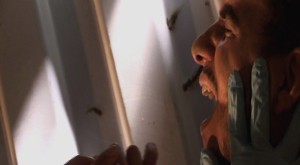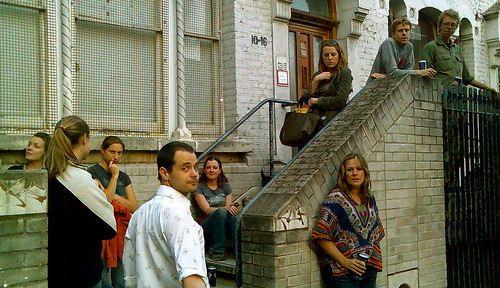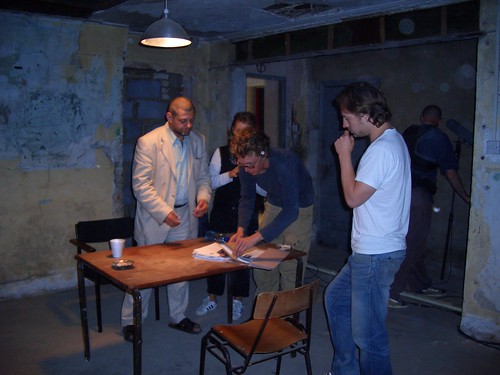Extraordinary Rendition: The opposite of documentary
Extraordinary Rendition, which first caught Netribution's attention ahead of its premiere at last year's Edinburgh festival, is due to be released on DVD on 28th April, and broadcast on the BBC in the same week.
Suchandrika Chakrabarti met up with director Jim Threapleton and producer Andy Noble, childhood friends turned filmmaking collaborators, to get an update on the improvised film's editing and innovative distribution, as well as to discover what "the opposite of documentary" means...
How did it feel to be nominated for a British Independent Film Award last October?
Andy: We were humbled to be in such exalted company really, the great and good of the British film industry. It was great to be recognised in that way.
Jim: The evening had the appropriate independent spirit, as opposed to the more formal Bafta enterprise.
Andy: I was quite relieved when we didn’t have to go up and collect anything – absolved me of the need to go up and say something coherent!
Jim: We were nominated for Best Achievement in Production, and it was a real achievement under the circumstances we did it.
Have you seen the Hollywood Rendition?
Jim: I haven’t seen it actually. The DVD comes out about the same time that ours does - they’re clearly trying to piggyback onto our release aren't they! I will go and see it at some point. The more people that are talking about this subject matter, the better. There has to be some kind of conclusion in a film that’s budgeted that high and made by a studio
Andy: They’ll get a very different and probably wider audience to us. The amount of marketing money that went into that film would have dictated the story somewhat. There has to be some kind of conclusion in a film that’s budgeted that high and made by a studio. Torture tears lives apart and is messy, I don’t think that there can be any simple answers really, in a satisfactory way. I hear that there’s a lot of explanation at the political level. Our approach has always been to portray something emotionally true, but to leave a lot of questions unanswered.
Jim: If audience takes something away, it’s the discussion. Not to have the clear, simple resolution or explanation. Staying true to a very rigorous mandate that we’d given ourselves. Our natural platform for our film was always going to be the festival circuit and broadcast and DVD as opposed to screening in Odeon cinemas across the country. It was telling that, while we’ve been travelling the festival circuit, the other Rendition was out, Lions for Lambs, Redacted… there's been a wave of political filmmaking, since Road to Guantanamo and Syriana…

Why did you choose to forego theatrical distribution?
Andy: The broadcast and DVD platforms are the more accessible audience platforms. We knew that in order to get the greatest access to the audience, it may not involve theatrical release. There would be DVD, a heavy presence on the web perhaps, broadcast, all of these elements we had to juggle. Once you’ve made your film, you really have to push it out there. You have to go and find the audience. We knew that in order to get the greatest access to the audience, it may not involve theatrical release
Jim: Making films at this micro-level, I think that online distribution is going to be increasingly exciting. It allows you to cut out the middle processes and reach a huge audience. The blog has been attracting up to 2000 hits a day.
Andy: You can stream it, people can download it and you’re cutting out the distribution, which can be very expensive. We’re lucky that we found a really enthusiastic DVD distributor called Liberation . They’re putting a lot behind our release. We’re doing a commentary – the ramblings of a couple of madmen… The BBC have also picked it up and there’s going to be a synchronised release with the DVD. They’ll be in the same week. Everyone’s talking about changing distribution models and we’re just at the start of it here really. I think eventually there’ll be a two-tier thing, and in the cities there’ll still be the arthouse circuit, the rest will be streamed.
Is blogging the filmmaking process part of the marketing?
Andy: I think a lot of the audience for this film is very engaged with the internet, and it’s where people find out about this subject. It’s important to have a presence online, and that's why I wrote the blog. The distributors were reading it and it was difficult to know what kind of tone to take, whether a confessional warts and all idea, or something that’s more politically engaged, or something with the idea that people from the industry are perhaps scrutinising. It’s a great record of the process, though. I think we talk quite frankly about the challenges. It was cathartic.
Jim: It’s definitely something that we’ll incorporate in the future. I’ve seen video diaries on other ones, that’s a very accessible way of articulating the experience of making a film. You do need to protect yourself from putting your daily immediate thoughts down. I wonder how much it does increase awareness.
How long was the editing process?
It was this improvised beast that needed shaping and taming in the edit Jim: It was this improvised beast that needed shaping and taming in the edit. It was a tough adventure to try and find the right structure. This made the first few festivals all the more exciting because we had only just finished it. We had never really had the opportunity to stand back, take a breath and work out if we’d made the right decisions; by the time we got to the end of the edit process we had to get it out there. The film's structure now plays with the various different timelines. They’re all intermingled. It’s a free-flowing portrait that goes backwards and forwards between different elements of his life.
Andy: Initially it was going to be a linear telling of the story, but that felt too didactic.
Jim: That structure roots you to his psychology, inherently. You would feel the gravity of his memories.
Andy: The editor is a guy called Brian Hovmand who is just a genius. We’ll be working with him again on our next project.
Jim: He has a background in documentaries. He’s a Danish editor, who immediately saw the value in what we were trying to do. We found a working relationship which I think is quite a rarity.
It’s an important one.
Jim: It is, and I’m thrilled with the outcome. I found an editor who gets my work. He has experience of the stories hidden in documentary footage. This was the opposite of documentary though. When you are having to wade through all those hours of footage… he had amazing patience, and knew where to pluck out the odd look or turn of phrase that would really sum up the scene that we were trying to concoct. The film was really made in that 20 weeks. I wouldn’t want to repeat that level of improvisation. It was invaluable at the time, a kind of crash course, a degree in filmmaking in 20 weeks.
Andy: Yeah… what is the opposite of documentary?
Jim: Um, I don’t know… a feature? This is very much the opposite of documentary.
Yes, what is the opposite of documentary?
Jim: There’s a question of technique, actual cinematic language, and there’s the question of intent and the kind of story you’re telling, really. I was always determined that we weren’t actually treading too closely to that kind of vérité style. I wanted it to be much more of an artistic, cinematic interpretation. George Orwell was an inspiration. It was never meant to be a shooting from the hip docu-drama. However, because of the improvised nature, the shooting style used a very busy eye. The long takes required a certain flexibility in the cameraman’s approach. This is a fictionalised account though.
Andy: Our starting point was to research exhaustively all the cases of rendition we could find. There had to be something authentic about it. We didn’t want to feel constrained by the need to reconstruct
Jim: Absolutely, but we didn’t want to feel constrained by the need to reconstruct. There are a few sequences in the film, such as the waterboarding, which we were very careful to make authentic, it’s very much a flashpoint for the debate around the subject.
What's next for you?
Jim: We’re working on a thriller. We’re just putting together the last elements of financing for a shoot this summer.
Andy: The principal casting has been done and gone really well. It couldn’t be more different. Although it is about real, ordinary people in extraordinary situations.
Jim: It is essentially a genre thriller. So we’re starting that journey again, another mountain to climb. We’ll be working with a more traditional structure, which will make life a bit easier. We’ll have a script.
Andy: Imagine that!
Jim: We developed it together and I’ve written it. We hope to be at Sundance next year with it, but we obviously have to see how things go. The plan is to have some of the same crew, to pay back some of the commitment. There are working relationships that have really nurtured the work. We want to stick with the people that we trust.

To contact the author:
